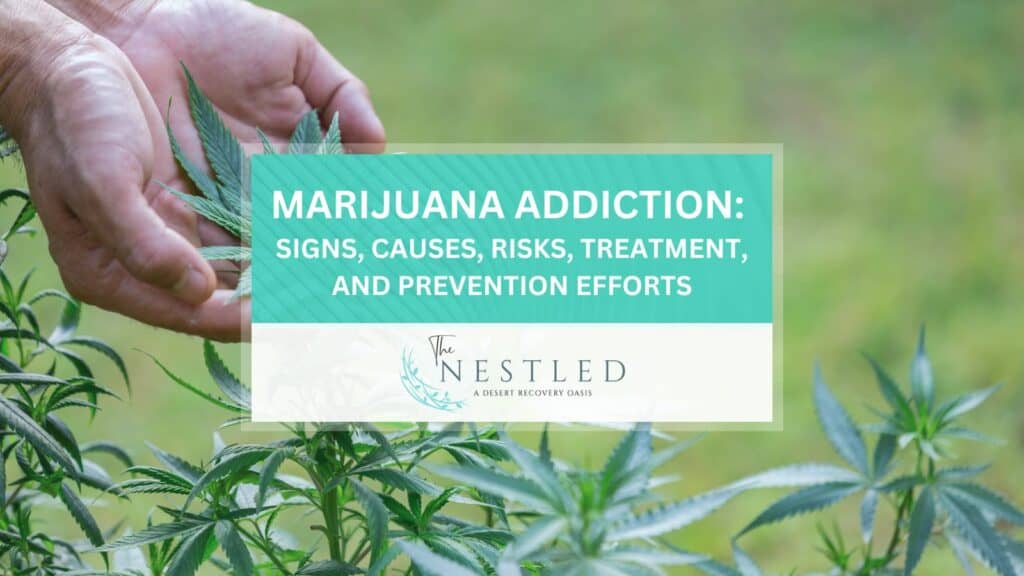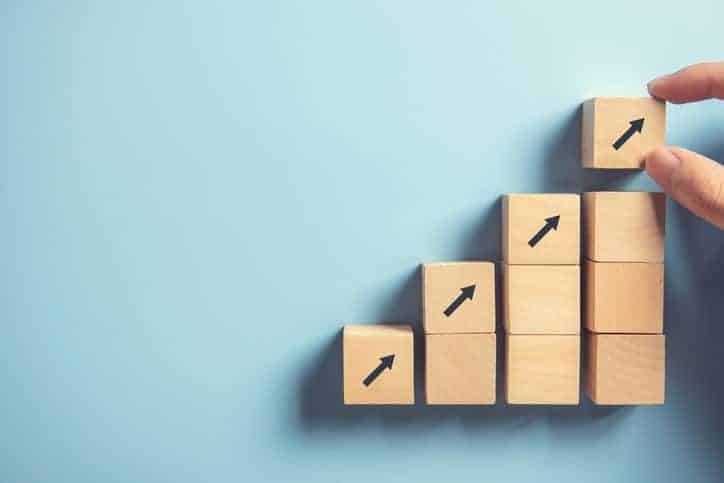Marijuana addiction is an intense urge to consume marijuana because of its euphoric effects, despite the negative effects it has. According to a 2016 study published in JAMA Psychiatry, approximately 3 in 10 people who use marijuana have marijuana use disorder. This drug triggers the release of dopamine in the brain, producing feelings of relaxation, euphoria, and altered perception of time and space. This feeling alters the brain receptors to depend on marijuana to function.
The cause of marijuana addiction involves a combination of genetic, environmental, and psychological factors. The brain gets used to the drug after prolonged use by reducing the production of and sensitivity to its endocannabinoid neurotransmitters.
Signs of marijuana addiction include an increased tolerance to the drug, withdrawal symptoms at any attempt to stop, using more marijuana than intended, and continued use despite acknowledging the problems it causes.
The risk factors influencing marijuana addiction include age, family history of substance abuse, and mental health conditions like trauma or chronic stress.
Treatment for marijuana addiction involves behavioral therapies, counseling, and support groups, and aftercare.
Preventing marijuana addiction starts with education about its potential risks and understanding the factors that lead to dependency. Avoiding early use, especially in teenagers, and monitoring for signs of misuse helps a lot.
What Is Marijuana Addiction?
Marijuana addiction is a compulsive consumption of marijuana despite it causing negative impacts on their life. People addicted to marijuana often find themselves unable to stop or reduce their marijuana use despite experiencing negative consequences in various areas of their lives, such as relationships, work, and health.
As reported by Hasin, Deborah S. et al. in the 2002 study ‘Prevalence of Marijuana Use Disorders in the United States Between 2001–2002 and 2012–2013,’ approximately 3 in 10 people who use marijuana have marijuana use disorder. For individuals who started using Cannabis before the age of 18, the risk of getting addicted to it becomes more significant.
Just like with other substances, not everyone who uses marijuana will become addicted, but for some, the urge to use it becomes too strong to ignore. This addiction develops over time, with the person needing more of the drug to feel the same effects, a process known as building tolerance.
What Are The Causes Of Marijuana Addiction?
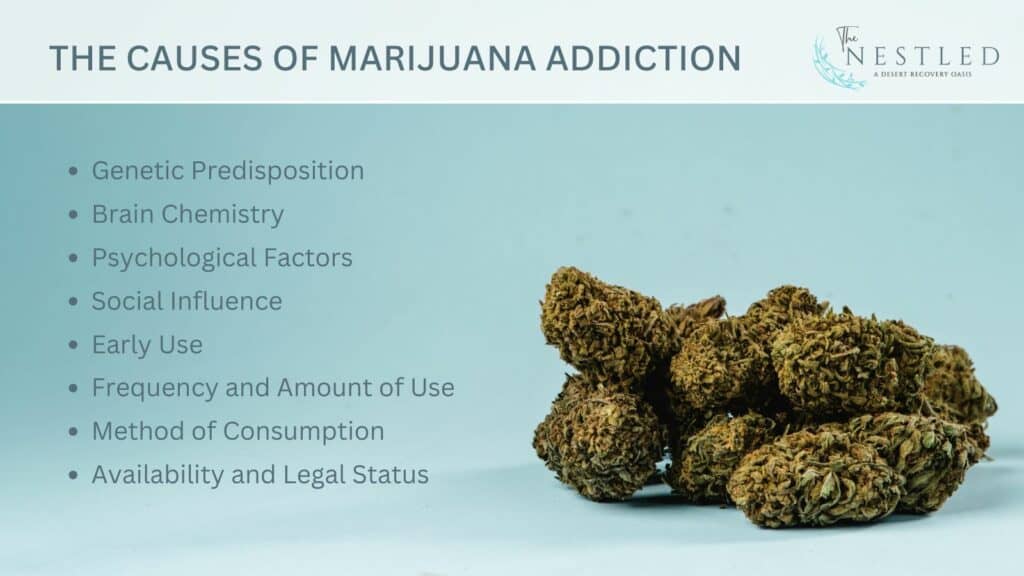
The causes of marijuana addiction are genetic predisposition, brain chemistry, psychological factors, early use, frequency, method of consumption, legal status, and social influence.
1. Genetic Predisposition: Individuals with a family history of addiction have a higher genetic tendency to become addicted to marijuana or other substances.
2. Brain Chemistry: Marijuana use affects the brain’s reward system. It causes the release of dopamine, a neurotransmitter associated with pleasure and satisfaction. Over time, the brain seeks repeated exposure to marijuana to sustain high dopamine levels, leading to dependency.
3. Psychological Factors: People often turn to marijuana to manage mental health issues like stress, anxiety, or depression. While it provides temporary relief, this coping mechanism leads to dependency as individuals rely more on the substance to manage their symptoms.
4. Social Influence: Peer pressure, social circles, and societal norms play a significant role. Being in an environment where marijuana use is common or encouraged increases the likelihood of usage and, subsequently, addiction. According to a study by the National Institutes of Health, NIH, Marijuana and or other illegal drugs are served in one-third of parties attended by those aged 15 to 20.
5. Early Use: Starting marijuana use at a young age increases the chances of developing an addiction. Winters and Lee’s 2008 study ‘ Likelihood of developing an alcohol and cannabis use disorder during youth: Association with recent use and age,’ individuals who start using marijuana before reaching the age of 18 are four to seven times likely to develop marijuana use disorder compared to those who start using the drug as adults.
6. Frequency and Amount of Use: The more frequently marijuana is used and the higher the doses, the greater the risk of developing a dependency. The 2012 study by Lopez-Quintero et al., published in the National Library of Medicine, estimates that approximately 10% of cannabis users are likely to develop an addiction. Over time, users will require more significant amounts to achieve the same effects.
7. Method of Consumption: The way marijuana is consumed also impacts the risk of addiction. For example, methods that deliver a higher concentration of THC more rapidly to the brain, such as dabbing or vaping, increase the likelihood of addiction.
9. Availability and Legal Status: Easier access to marijuana contributes to higher rates of use and potential addiction.
What Are The Signs Of Marijuana Addiction?
Signs of Marijuana addiction are:
- Increased tolerance to the drug
- Withdrawal symptoms like irritability, restlessness, insomnia, decreased appetite, and mood swings
- Compulsive usage of the drug, even though it’s causing physical or psychological problems
- Attempting to quit using marijuana and failing at it
- Preoccupation with marijuana, neglecting more important things
- Loss of control over marijuana use despite its negative consequences
- Social withdrawal
- Changes in behavior such as irritability, anxiety, and depression.
What Are The Risk Factors Influencing Marijuana Addiction?
The risk factors affecting marijuana addiction are:
- Peer pressure
- Sexual abuse
- Family history
- Cigarette use
- Mental health disorder
- Stressful or traumatic life events
- Peer pressure
What Are The Physical Effects Of Marijuana Addiction?
6 ways marijuana addiction affects the users’ physical health are respiratory, cardiovascular, impaired coordination, cognitive impairment, gastrointestinal, and dependency.
- Respiratory Issues: Smoking marijuana leads to respiratory problems similar to those caused by tobacco smoke, such as chronic coughing, increased phlegm production, and lung irritation. Long-term use also increases the risk of respiratory infections and bronchitis.
- Cardiovascular Effects: Marijuana use causes temporary increases in heart rate and blood pressure, which may pose risks for individuals with pre-existing heart conditions. Prolonged or heavy use contributes to an increased risk of cardiovascular diseases.
- Impaired Coordination: Marijuana affects motor skills and coordination, leading to impaired balance, slower reaction times, and decreased coordination. This impairment increases the risk of accidents and injuries, particularly when operating machinery or driving.
- Cognitive Impairment: Chronic marijuana impairs cognitive function, affecting memory, attention, and decision-making abilities. These cognitive impairments persist even after the acute effects of marijuana have worn off, impacting daily functioning and productivity.
- Gastrointestinal Issues: Marijuana use causes gastrointestinal problems such as nausea, vomiting, and abdominal pain. These symptoms are particularly problematic for individuals with underlying gastrointestinal conditions or those prone to digestive issues.
- Dependence and Withdrawal Symptoms: Continued marijuana use leads to dependence, characterized by withdrawal symptoms such as irritability, insomnia, decreased appetite, and mood disturbances when attempting to quit or cut back on use.
What Are The Mental Effects Of Marijuana Addiction?
Marijuana addiction affects its users in 3 ways;
- Impaired memory and cognitive function
- Anxiety or paranoia
- Lack of motivation
How Does Marijuana Affect The Brain
Marijuana affects the brain primarily through its active ingredient, delta-9-tetrahydrocannabinol (THC), which interacts with the brain’s endocannabinoid system. THC binds to cannabinoid receptors in various regions of the brain, particularly the CB1 receptors, which are abundant in areas involved in cognition, memory, coordination, and pleasure.
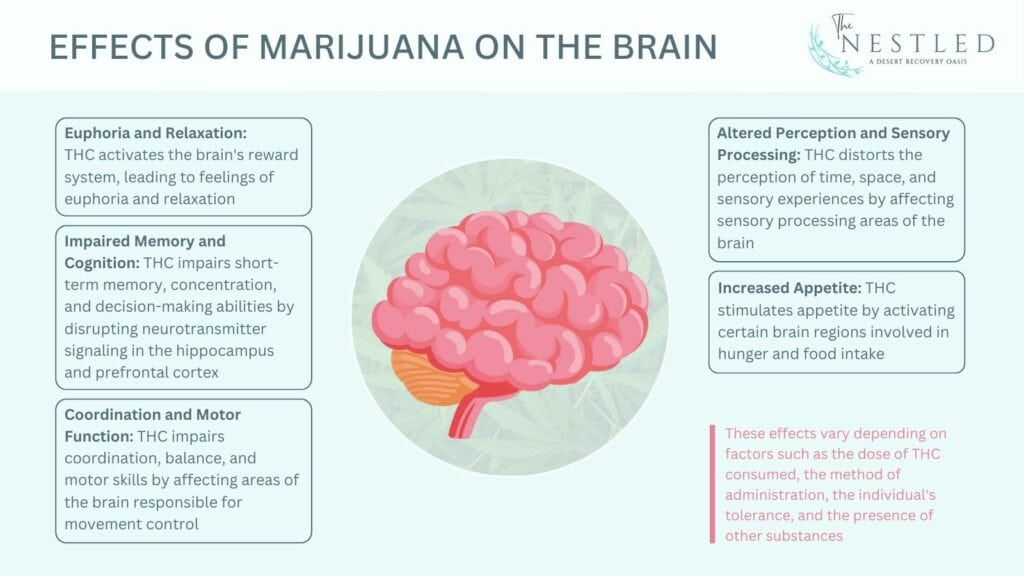
According to Centers for Disease Control and Prevention, marijuana affects the brain in 6 ways;
- Euphoria and Relaxation: THC activates the brain’s reward system, leading to feelings of euphoria and relaxation.
- Impaired Memory and Cognition: THC impairs short-term memory, concentration, and decision-making abilities by disrupting neurotransmitter signaling in the hippocampus and prefrontal cortex.
- Altered Perception and Sensory Processing: THC distorts the perception of time, space, and sensory experiences by affecting sensory processing areas of the brain.
- Increased Appetite: THC stimulates appetite by activating certain brain regions involved in hunger and food intake.
- Coordination and Motor Function: THC impairs coordination, balance, and motor skills by affecting areas of the brain responsible for movement control.
These effects vary depending on factors such as the dose of THC consumed, the method of administration, the individual’s tolerance, and the presence of other substances.
What Are The Social Effects Of Marijuana Addiction?
Three social effects of marijuana addiction are;
- Withdrawal from social activities
- Relationship conflicts
- Decreased productivity at work or school
What Are The Behavioral And Social Consequences Of Marijuana Use?
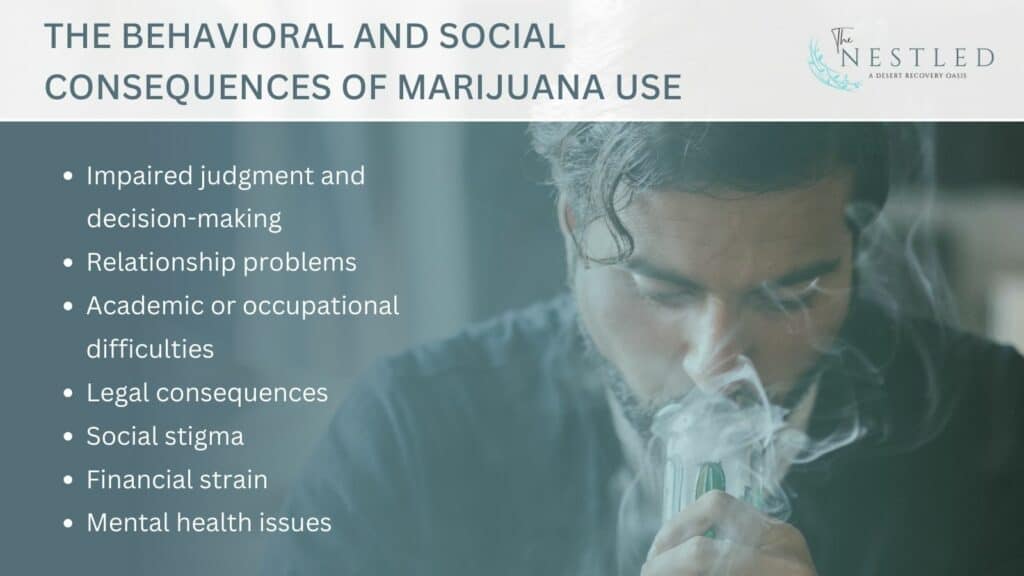
Seven behavioral and social consequences of marijuana use are;
- Impaired judgment and decision-making: Marijuana use impairs cognitive function, leading to poor decision-making and risky behaviors such as driving under the influence or engaging in unsafe sexual practices. A 2017 report by the National Academies of Sciences, Engineering, and Medicine states that there is significant evidence linking cannabis use to a higher risk of motor vehicle accidents.
- Relationship problems: Heavy or problematic marijuana use strains relationships with family members, friends, and romantic partners, leading to conflicts and misunderstandings.
- Academic or occupational difficulties: Chronic marijuana use impacts academic or work performance, resulting in lower grades, absenteeism, or disciplinary issues.
- Legal consequences: Marijuana bears legal consequences In many jurisdictions for its possession, distribution, or use of marijuana.
- Social stigma: Despite increasing acceptance and legalization of marijuana in some regions, the social stigma surrounding marijuana use still exists, leading to discrimination or social isolation for individuals who use marijuana.
- Financial strain: Regular marijuana use is costly, especially for individuals who develop a tolerance and require larger quantities to achieve the desired effects. It leads to financial difficulties and strain on personal finances.
- Poor memory: Chronic use of marijuana, especially when started at a young age, may affect the brain’s ability to consolidate new information into long-term memory. The Centers for Disease Control and Prevention state that using marijuana before the age of 18 can influence brain development, particularly in areas related to attention, memory, and learning.
How Is Marijuana Addiction Treated?
The 6 ways to treat marijuana addiction are behavioral therapies, peer support, outpatient programs, inpatient treatment, family therapy, and lifestyle change. These strategies are tailored to fit an individual’s specific needs.
1. Behavioral Therapies: These are the most commonly recommended treatments for marijuana addiction according to Yale Medicine:
- Cognitive-behavioral therapy (CBT): It helps individuals recognize and change negative thinking patterns and behaviors related to drug use.
- Motivational Enhancement Therapy (MET): This treatment aims to create a fast, internally motivated change rather than guide the individual through the recovery process.
- Contingency Management: It encourages abstinence from marijuana use through positive reinforcements.
2. Peer Support: Engaging in peer groups like Marijuana Anonymous or SMART Recovery offers a community of individuals facing similar challenges. It provides encouragement and accountability.
3. Outpatient Programs: These programs allow individuals with marijuana addiction to receive treatment and counseling during the day and return home in the evenings. This option is perfect for people with mild to moderate addiction levels.
4. Inpatient or Residential Treatment: Individuals can opt to stay at a treatment facility that offers comprehensive services. According to the Addiction Center, an inpatient treatment center can be beneficial for individuals with cannabis use disorder by removing them from environments and situations, or daily triggers, that are not conducive to recovery. These services include medical and psychological support, which are necessary to prevent use and address underlying issues.
5. Family Therapy: Family therapy involves family members in the treatment process to improve communication, resolve conflicts, and support the individual’s addiction recovery.
6. Lifestyle Changes: Lifestyle changes, such as healthy habits, like regular exercise, proper nutrition, and engaging in new hobbies or activities, support recovery by improving physical and mental health.
What Are The Withdrawal Symptoms Of Marijuana Addiction?
According to the American Addiction Center, withdrawal symptoms of marijuana addiction include:
- Irritability
- Anxiety
- Insomnia
- Decreased appetite
- Mood swings
- Restlessness
- Cravings for marijuana
What Are Prevention Efforts For Marijuana Addiction?
Prevention efforts for marijuana addiction focus on reducing the start and misuse of marijuana, particularly among young people.
The following are some of the strategies that help prevent marijuana addiction:
- Education: Providing accurate information about the risks and adverse effects of marijuana use, including its impact on mental and physical health, will help individuals make informed decisions.
- School-Based Programs: creating interactive drug prevention programs in schools will educate students about the risks of marijuana and other substances.
- Community Involvement: Engaging communities through workshops, seminars, and public health campaigns will raise awareness about the risks associated with marijuana use.
- Family Engagement: Encouraging open communication within families about the dangers of drug use and establishing solid and supportive relationships is a powerful preventive measure.
- Policy and Regulation: Enforcing laws and regulations related to marijuana sales, distribution, and use, including age restrictions, will help limit access and reduce use among adolescents and young adults.
- Early Intervention: Identifying and addressing early signs of substance misuse in individuals to prevent escalation to addiction.
- Promotion of Healthy Activities: Encouraging participation in sports, arts, and community volunteering will provide positive alternatives to drug use by filling the need for social connection and personal achievement.
- Mental Health Support: Offering accessible mental health services will help address underlying issues like anxiety, depression, or trauma, which may contribute to substance abuse.
What Are The Types Of Marijuana?
Three types of marijuana are categorized by their species and strains: cannabis sativa, cannabis indica, and hybrid strain.
- Cannabis sativa: The sativa strain is known for its energizing and uplifting effects. It is often used during the day for its cerebral and creative effects.
- Cannabis indica: Indica strains are known for their soothing and relaxing effects, making them popular for evening or nighttime use to promote relaxation and sleep.
- Hybrid strains: These are crossbreeds of sativa and indica plants, combining characteristics of both. Depending on the specific genetics of the plants, hybrid strains can vary widely in their effects.
Within each type, there are numerous strains, each with its unique combination of cannabinoids (such as THC and CBD) and terpenes, which contribute to the overall effects and flavors of the marijuana.
How Do I Treat Marijuana Overdose?
If someone consumes a large amount of marijuana and experiences distressing symptoms, it’s important to stay calm and provide reassurance. Encourage the person to rest in a comfortable and safe environment. Offer water and snacks to help alleviate any discomfort.
If the person is experiencing severe symptoms such as extreme anxiety or paranoia, seeking medical help or contacting poison control for guidance is advisable. There is no known lethal dose of marijuana, and overdosing on marijuana is rare.
Where To Seek Treatment For Marijuana Addiction?
Treatment for marijuana addiction is available at rehabilitation centers, addiction treatment facilities, or through medical professionals specializing in addiction recovery.
What Are The Different Slang Terms For Marijuana?
Slang terms for marijuana include weed, pot, ganja, and Mary Jane.
What Are The Law Enforcement Actions And Legal Ramifications Of Marijuana?
Law enforcement agencies focus on controlling marijuana distribution and use through legal means.
What Is The Role Of Law Enforcement Agencies In Combating Marijuana Distribution And Use?
Law enforcement agencies regulate and enforce laws related to marijuana distribution and use.\
How does marijuana addiction compare to benzodiazepine addiction in terms of symptoms and treatment?
Marijuana addiction and benzodiazepine addiction, while both serious, present with different symptoms and require distinct treatment approaches. Marijuana addiction typically involves symptoms such as increased tolerance, withdrawal symptoms like irritability and sleep disturbances, and a preoccupation with obtaining and using the drug. Benzodiazepine addiction, on the other hand, can cause severe withdrawal symptoms such as anxiety, seizures, and insomnia, along with tolerance and dependence. Treatment for marijuana addiction often includes behavioral therapies like cognitive-behavioral therapy (CBT) and support groups. Benzodiazepine addiction treatment usually requires a medically supervised tapering process to safely reduce the dosage, combined with counseling and support services.
What are the risks of combining marijuana with hydrocodone, and how can this lead to addiction?
Combining marijuana with hydrocodone poses significant risks and can lead to compounded addiction issues. Both substances affect the central nervous system but in different ways; marijuana primarily alters perception and mood, while hydrocodone is a potent opioid painkiller that can depress respiratory function. Using them together can enhance the effects of each drug, leading to increased risk of respiratory depression, severe sedation, and potentially fatal overdose. Additionally, the concurrent use of both substances can accelerate the development of tolerance and physical dependence, making addiction more likely.
What Are The Policies And Implications Related To Marijuana Control?
Policies regarding marijuana control aim to regulate its production, distribution, and use.
What Are The Legal Penalties For Using And Selling Marijuana?
The legal consequences of using and selling marijuana can include fines, imprisonment, and legal records.
How Do The Effects Of Marijuana Addiction Differ From Those Of Cocaine Addiction?
The effects of marijuana addiction differ from cocaine addiction in terms of their impact on the body and mind.

Share This Post

